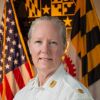The following content is part of a new FireRescue1 initiative – the Fire Leader Playbook – aimed at helping new fire service leaders increase their effectiveness, enhance their leadership KSAs, develop trust among crewmembers, and build confidence. Through a handful of questions presented by FireRescue1, veteran fire service leaders reflect on their early days in leadership roles and offer advice, while newer leaders detail their experiences taking on a new position. Email editor@firerescue1.com to offer your insights for the Fire Leader Playbook.
Following are the Chief Insights from Joanne Rund, fire chief of the Baltimore County Fire Department.
What was the incident or person in your career that put you on the path to becoming a chief?
I credit the path I began as a firefighter when my lieutenant saw potential in me and gave me the opportunity to learn from him. When I was a young firefighter only 5 years on the job, he provided me the opportunity to run the floor and assign duties. He guided me and mentored me, and as I grew, he encouraged me to take the next step to become a lieutenant myself.
As a lieutenant, my captain at the time was thinking of retiring, so he began teaching me what he knew and encouraged me to take the next step to become a captain. This is where it gets interesting: Our department experienced an outside chief for the first time, and that chief saw potential in me as well, encouraging me to take the next step for battalion chief and allowing me to begin building the Health and Safety Bureau for the department.
Then the challenge began when another outside chief came in and did not like me, so he decided to take apart everything I had built and put me in a corner. That is when a good friend stepped in and encouraged me to keep focused and stay the course – that I would make a good fire chief one day. Who me? I never thought about that until that time – the lowest time in my career.
I began courses and focused on that while I studied and got involved in as many programs as I could to spin something negative into a positive.
FESDI gave me the leg up I needed. I read Lamont Ewell’s book “Reaching for the Gold: How to Successfully Prepare for Police and Fire Chief Interviews.” I followed it to the letter, and that is what I credit for where I am today.
Looking back, what did you want to accomplish, improve or make better in your first 30 days, 6 months and year as chief?
I built a 30-, 60-, 90-day plan. I was coming in from the outside, so I needed to learn policies, procedures and, honestly, how this department ran.
- 30 days: Visit all the stations and meet everyone (54 stations and approximately 2,500 personnel, both career and volunteer).
- 60 days: Provide a written report for my boss on my initial evaluation of the department and begin to design a vision plan to move forward.
- 90 days: Meet with the command staff and tell them where we are heading and my expectations moving forward.
- 6 months: Evaluate what we have accomplished and update the plan.
- 1 year: Have improved programs in place to pilot.
We are now cresting the 4-year mark and are developing a strategic plan for the department to have a document to work off and continue when I am no longer here.
What is the best advice you would give chiefs in their first 30 days on the job?
If you are from the outside, do your SWOT analysis before you discuss what your plans are. Focus on meeting your people and understanding what the actual needs are compared to what you are being told.
If you are being promoted from within, the fire chief position is very different from other levels of the department, and relationships are a large part of what you do. Take time to build and foster those relationships, especially with your boss. Make sure they understand that you need the autonomy to do your job and the supporting funds to accomplish any needed changes you may have.
If you could go back to your rookie/probie self, what would you tell them?
Shoot for the stars and become good at what you do. Find your niche and excel!
Lightning round leadership
- What is a leadership book, podcast or seminar you’ve found invaluable? Lamont Ewell’s book “Reaching for the Gold: How to Successfully Prepare for Police and Fire Chief Interviews”
- How do you organize your schedule and stay on schedule? I have a multi-step approach: Your admin has to be tuned into what you do. Take them with you and teach them when you first start working with them. That will help them understand your needs. In my case, calendar with time built in for project completion, and open time for unexpected items that come up throughout the day. I touch base with my admin early in the morning and late in the day for any discussion items needed. Your success depends on your organizational skills and ability to overcome and adapt. So, calendar update twice a day and everything goes on my calendar, even reminders for project deadlines, etc.
- If you knew the budget request would be approved, what’s a big purchase you’d make for your department today? New academy with the staff to cover our needs
- At the end of the workday, how do you recharge? I do yoga twice a day, first in the morning to start my day and in the evening to wind down. If I don’t have time to do yoga and I am exhausted, I just get into my PJ’s and watch mindless TV or read.




